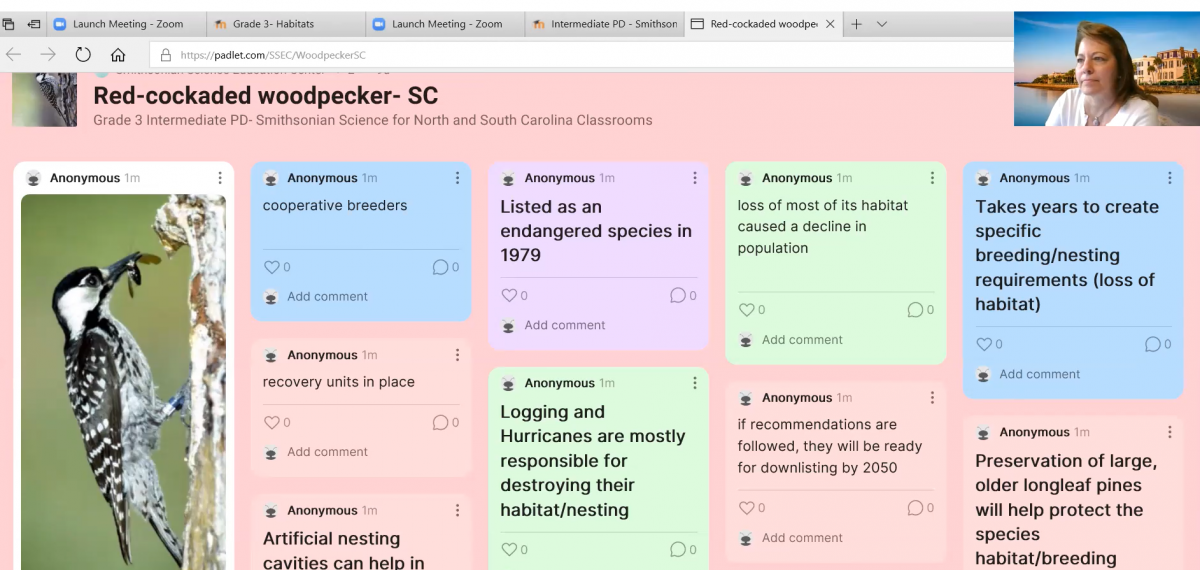Professional Development in North and South Carolina, vol. 3
The Smithsonian Science Education Center (SSEC) launched the Smithsonian Science for North and South Carolina Classrooms program in 2019 with a U.S. Department of Education early phase Education Innovation and Research (EIR) grant. Read the previous installment in this blog series here.
Carmelina Livingston is a Lead Education Specialist at Solutions in Science, Technology, Engineering, and Mathematics Education (S²TEM Centers SC) and formerly an elementary and informal educator. She has attended and facilitated professional development for third grade teachers in South Carolina on the Smithsonian Science for the Classroom modules How Can We Protect Animals When Their Habitat Changes? in March and August 2021 and How Can We Predict Patterns of Motion? in summer 2022.
We spoke with Carmelina in 2021 after virtual professional development to learn more about her experiences with the program.
——————————
SSEC: Why is science education important to you?
Carmelina: Well, it’s always been important to me. It’s actually the backbone of everything I do! Science is an integral part of everyday living, such as weather and how we use weather, medicine, when earthquakes happen, getting food sources from agriculture, designing useful technology to assist in gathering data for us to have knowledge, but also have application in our world. This is essential for us to see the connection to science facts and theories and apply this information to everyday living.
SSEC: What would you describe as your most memorable moment during the professional development sessions?
Carmelina: The most memorable moments happened when teachers would learn new content and information and then demonstrate their understanding in creative and engaging ways. I love to see them have these moments of realization and how their passion after learning new information translates into their own instruction.
SSEC: How has participating in and also leading professional development on Smithsonian Science for the Classroom impacted your own practice?
Carmelina: It’s all about the connections to the joy of teaching and getting the chance to reflect with teachers on their classroom instruction by sharing ideas on strategies, assessment, student engagement, and supplemental resources that would complement instruction. I have gained so much by working together online with the teachers to explore scientific phenomenon and content and then putting it into practice by facilitating fun, engaging, inquiry, and standards-based lessons with students.
 In this screenshot from PD, Carmelina facilitates a conversation with teachers using padlet about the red-cockaded woodpecker.
In this screenshot from PD, Carmelina facilitates a conversation with teachers using padlet about the red-cockaded woodpecker.
SSEC: What type of support does this give teachers as they go through these types of experiences?
Carmelina: I really like that teachers not only learn about curricular resources that are standards-based, engaging, and inquiry-based, but they also get a chance to do the activities and learn from one other. The teachers that I worked with exchanged great ideas with other teachers about how to approach different lessons and were very receptive to learning from each other.
SSEC: How do you see Smithsonian Science for the Classroom impacting the practice of South Carolina teachers?
Carmelina: South Carolina teachers will benefit greatly by having these modules available in their classrooms because all investigations are standards-based and highly engaging. The lessons are also adaptable to both physical and virtual classroom settings and enable teachers and their students to investigate science phenomena together.
SSEC: What are the benefits to students experiencing Smithsonian Science for the Classroom modules?
Carmelina: Students will benefit greatly because teachers have practiced the lessons with their peers prior to using the module materials and resources. If teachers consistently experience the best practices in science instruction and have a chance to learn and reflect with their peer teachers, then you will see exemplary science instruction and student achievement in the classrooms.